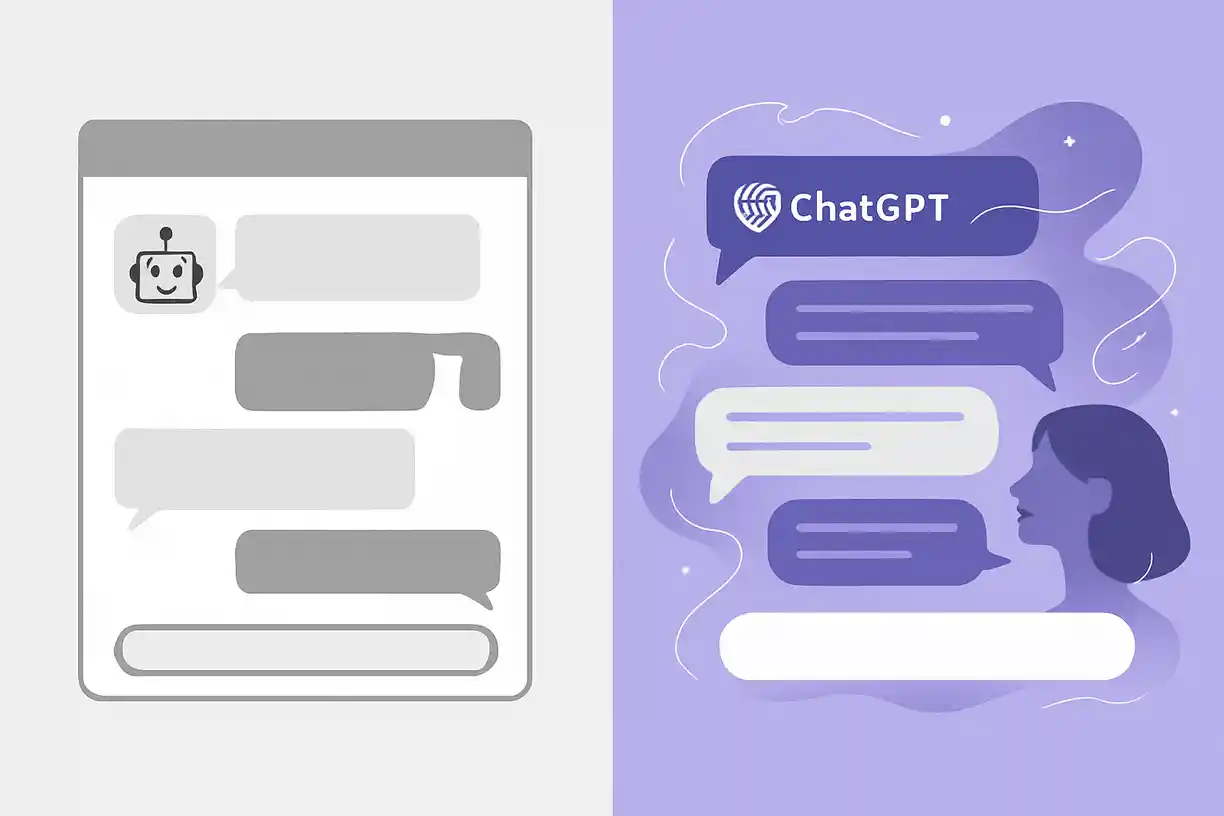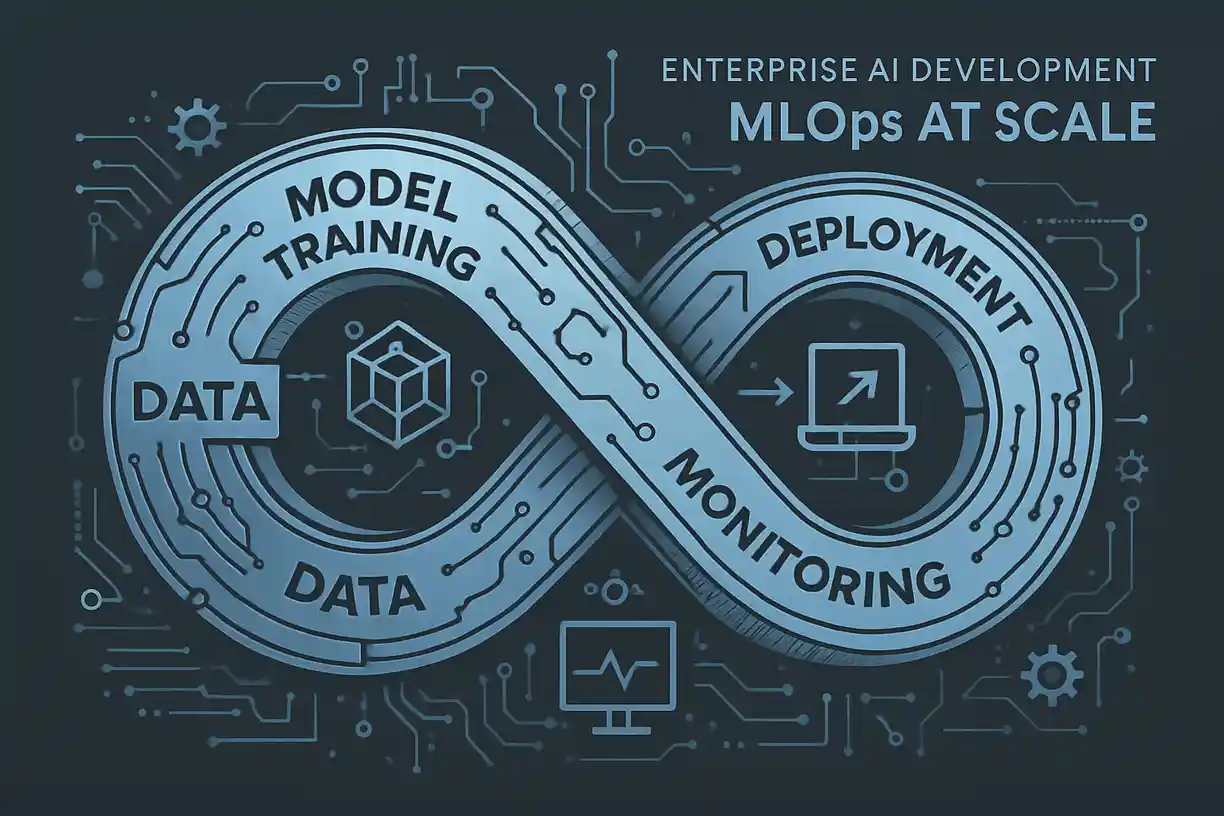7 months ago
ChatGPT Development vs Traditional Chatbot Development: Key Differences
In today’s digital landscape, businesses are increasingly turning to conversational AI to elevate customer experience, automate support, and drive operational efficiency. While chatbot solutions have existed for more than a decade, a new generation of intelligent systems has emerged—led by ChatGPT Development. Unlike traditional chatbot development, which relies heavily on rule-based logic and keyword recognition, ChatGPT Development harnesses the power of large language models (LLMs), enabling natural, human-like conversations that evolve with each interaction. In this blog, we explore the key differences between these two approaches, and why modern enterprises are shifting toward ChatGPT-based implementations for their AI development, app development, and AI chatbot development needs.
Understanding Traditional Chatbot Development
Traditional chatbots are typically built on decision-tree logic, natural language processing (NLP) pipelines, and structured scripting techniques. These bots are designed to recognize specific keywords and direct users along predefined paths. For example, if a customer types "I want to check my order," the bot looks for keywords like "check" and "order" and offers a canned response or links to tracking systems.
Although this approach is functional, it is extremely limited in flexibility. These bots cannot understand context, humor, or intent beyond what they are programmed for. This lack of adaptability makes them less useful in dynamic environments where customer queries can be unpredictable or unstructured. Even with years of custom software development behind them, traditional bots often struggle to handle complex, multi-turn conversations or unexpected questions.
The Rise of ChatGPT Development and Generative AI
ChatGPT Development takes chatbot technology several steps further. Powered by transformer-based models like GPT-4 and beyond, ChatGPT bots are trained on massive datasets, allowing them to generate highly contextual, human-like text. These models are capable of understanding nuances in language, maintaining context across interactions, and providing accurate responses—even in complex conversations.
A leading ChatGPT Development company integrates such AI models into business ecosystems, delivering next-gen AI chatbot development solutions that go far beyond keyword matching. With conversational memory, semantic understanding, and the ability to write content on-the-fly, ChatGPT is redefining how businesses approach customer communication, onboarding, virtual assistance, and more.
AI Development Methodologies Behind Both
Traditional chatbots are built using a mix of simple NLP tools, APIs, and scripting frameworks. Developers must anticipate every possible query and code an appropriate response. Updates require manual adjustments, and scalability is often a challenge when new features or language inputs are introduced.
In contrast, ChatGPT Development leverages deep learning frameworks and pre-trained LLMs, drastically reducing the time and effort required to train a bot. Companies can fine-tune existing models for specific domains using fewer data inputs. Integration with AI agent development frameworks allows these models to interact autonomously with APIs, databases, and other systems. As a result, businesses experience faster deployment cycles, reduced operational overhead, and improved accuracy.
A quality ChatGPT Development service often involves ongoing model tuning, prompt engineering, data optimization, and feedback loops—making it a more advanced and scalable strategy than traditional methods.
Integration with App and Web Development
One of the most significant advantages of ChatGPT Development is its seamless integration capabilities across platforms. Whether in app development, web development, or hybrid systems, GPT-powered chatbots can be embedded effortlessly and function at a high level of performance. These bots can interpret user queries in real time, handle unstructured requests, and support multilingual interactions without the need for extensive reprogramming.
In contrast, traditional chatbots are more difficult to scale across multiple platforms. Updating their core logic for different applications often involves re-coding, UI adjustments, and retesting workflows. This is especially problematic in fast-moving industries like fintech, healthcare, and retail, where adaptability and speed-to-market are critical.
With a well-architected ChatGPT Development solution, businesses can build one AI chatbot that serves multiple platforms with minimal customization, resulting in a consistent and cohesive user experience.
visit- https://www.sparkouttech.c...
In today’s digital landscape, businesses are increasingly turning to conversational AI to elevate customer experience, automate support, and drive operational efficiency. While chatbot solutions have existed for more than a decade, a new generation of intelligent systems has emerged—led by ChatGPT Development. Unlike traditional chatbot development, which relies heavily on rule-based logic and keyword recognition, ChatGPT Development harnesses the power of large language models (LLMs), enabling natural, human-like conversations that evolve with each interaction. In this blog, we explore the key differences between these two approaches, and why modern enterprises are shifting toward ChatGPT-based implementations for their AI development, app development, and AI chatbot development needs.
Understanding Traditional Chatbot Development
Traditional chatbots are typically built on decision-tree logic, natural language processing (NLP) pipelines, and structured scripting techniques. These bots are designed to recognize specific keywords and direct users along predefined paths. For example, if a customer types "I want to check my order," the bot looks for keywords like "check" and "order" and offers a canned response or links to tracking systems.
Although this approach is functional, it is extremely limited in flexibility. These bots cannot understand context, humor, or intent beyond what they are programmed for. This lack of adaptability makes them less useful in dynamic environments where customer queries can be unpredictable or unstructured. Even with years of custom software development behind them, traditional bots often struggle to handle complex, multi-turn conversations or unexpected questions.
The Rise of ChatGPT Development and Generative AI
ChatGPT Development takes chatbot technology several steps further. Powered by transformer-based models like GPT-4 and beyond, ChatGPT bots are trained on massive datasets, allowing them to generate highly contextual, human-like text. These models are capable of understanding nuances in language, maintaining context across interactions, and providing accurate responses—even in complex conversations.
A leading ChatGPT Development company integrates such AI models into business ecosystems, delivering next-gen AI chatbot development solutions that go far beyond keyword matching. With conversational memory, semantic understanding, and the ability to write content on-the-fly, ChatGPT is redefining how businesses approach customer communication, onboarding, virtual assistance, and more.
AI Development Methodologies Behind Both
Traditional chatbots are built using a mix of simple NLP tools, APIs, and scripting frameworks. Developers must anticipate every possible query and code an appropriate response. Updates require manual adjustments, and scalability is often a challenge when new features or language inputs are introduced.
In contrast, ChatGPT Development leverages deep learning frameworks and pre-trained LLMs, drastically reducing the time and effort required to train a bot. Companies can fine-tune existing models for specific domains using fewer data inputs. Integration with AI agent development frameworks allows these models to interact autonomously with APIs, databases, and other systems. As a result, businesses experience faster deployment cycles, reduced operational overhead, and improved accuracy.
A quality ChatGPT Development service often involves ongoing model tuning, prompt engineering, data optimization, and feedback loops—making it a more advanced and scalable strategy than traditional methods.
Integration with App and Web Development
One of the most significant advantages of ChatGPT Development is its seamless integration capabilities across platforms. Whether in app development, web development, or hybrid systems, GPT-powered chatbots can be embedded effortlessly and function at a high level of performance. These bots can interpret user queries in real time, handle unstructured requests, and support multilingual interactions without the need for extensive reprogramming.
In contrast, traditional chatbots are more difficult to scale across multiple platforms. Updating their core logic for different applications often involves re-coding, UI adjustments, and retesting workflows. This is especially problematic in fast-moving industries like fintech, healthcare, and retail, where adaptability and speed-to-market are critical.
With a well-architected ChatGPT Development solution, businesses can build one AI chatbot that serves multiple platforms with minimal customization, resulting in a consistent and cohesive user experience.
visit- https://www.sparkouttech.c...
7 months ago
Understanding How an Enterprise AI Development Company Implements MLOps at Scale
Introduction: The Rising Demand for Scalable AI Operations
In today's fast-paced digital world, artificial intelligence is not merely an innovation—it's a necessity for competitive survival. Organizations across industries are aggressively integrating AI solutions to automate, predict, and personalize their workflows. However, the challenge doesn’t stop at building a model; the real complexity lies in maintaining, monitoring, and scaling these models in production environments. This is where a trusted Enterprise AI Development Company plays a pivotal role. Through a discipline known as MLOps (Machine Learning Operations), these companies bring together the best of DevOps, data engineering, and AI lifecycle management to ensure consistent delivery and optimization of AI services at scale.
The Technical Core of MLOps in Enterprise AI Development
To understand how an Enterprise AI Development Company implements MLOps, it's important to grasp its core components. MLOps includes processes such as continuous integration and continuous deployment (CI/CD) of ML models, data versioning, automated testing, model registry, monitoring, and rollback mechanisms. These operations are vital to ensure that the AI models work reliably in real-time environments and adapt well to evolving data patterns.
Companies specializing in Enterprise AI Development deploy infrastructure that automates the entire AI model lifecycle—from training and deployment to retraining and monitoring. These systems are often integrated with Kubernetes, Docker, and orchestration pipelines to manage resources dynamically and minimize operational overheads. These services are crucial in sectors dealing with massive data inflow, such as healthcare, e-commerce, and finance.
How Enterprise AI Development Companies Align MLOps with Business Goals
Implementing MLOps at scale is not only a technical achievement but also a strategic business decision. A well-established Enterprise AI Development Company begins by aligning MLOps architecture with a client’s overarching business goals. For instance, a retail business seeking real-time customer recommendations will require a robust MLOps pipeline that handles frequent data ingestion, model retraining, and low-latency predictions.
Through agile Enterprise AI Development services, these companies customize pipelines for specific business use cases. Whether it's automating quality control in manufacturing or predicting user churn in a SaaS platform, the role of MLOps is tailored accordingly. This strategic implementation enables businesses to reduce time-to-market, minimize operational risks, and maintain regulatory compliance.
Custom Software Development for AI-Centric Workflows
MLOps demands a strong foundation in custom software development. Off-the-shelf solutions often lack the flexibility to support dynamic AI models and evolving business workflows. That’s why an Enterprise AI Development Company solution typically includes building customized microservices, data pipelines, and APIs that tightly integrate with AI workflows.
Such custom-built solutions also enable seamless integration with app development platforms and web development frameworks, allowing AI-driven insights to be easily accessible across digital channels. Whether it's embedding an AI-powered recommendation engine into a mobile app or integrating a real-time fraud detection module into a banking portal, tailored software ensures optimal performance and adaptability.
Conclusion: Why Choosing the Right Enterprise AI Development Company Matters
Successfully implementing MLOps at scale is no longer a luxury—it’s a business imperative. It requires a deep understanding of AI infrastructure, model lifecycle management, software engineering, and cloud-native technologies. A specialized Enterprise AI Development Company brings all these capabilities under one roof, making it a strategic partner for long-term AI success.
By offering a complete Enterprise AI Development service that encompasses AI development, app development, web development, custom software development, AI chatbot development, and AI agent development, these companies ensure that businesses are well-equipped for the future.
Enterprises seeking sustained competitive advantage should not just invest in AI—they should partner with a company that knows how to scale it. MLOps is the bridge between a brilliant AI idea and a successful AI product, and the right partner makes all the difference.
visit: https://www.sparkouttech.c...
Introduction: The Rising Demand for Scalable AI Operations
In today's fast-paced digital world, artificial intelligence is not merely an innovation—it's a necessity for competitive survival. Organizations across industries are aggressively integrating AI solutions to automate, predict, and personalize their workflows. However, the challenge doesn’t stop at building a model; the real complexity lies in maintaining, monitoring, and scaling these models in production environments. This is where a trusted Enterprise AI Development Company plays a pivotal role. Through a discipline known as MLOps (Machine Learning Operations), these companies bring together the best of DevOps, data engineering, and AI lifecycle management to ensure consistent delivery and optimization of AI services at scale.
The Technical Core of MLOps in Enterprise AI Development
To understand how an Enterprise AI Development Company implements MLOps, it's important to grasp its core components. MLOps includes processes such as continuous integration and continuous deployment (CI/CD) of ML models, data versioning, automated testing, model registry, monitoring, and rollback mechanisms. These operations are vital to ensure that the AI models work reliably in real-time environments and adapt well to evolving data patterns.
Companies specializing in Enterprise AI Development deploy infrastructure that automates the entire AI model lifecycle—from training and deployment to retraining and monitoring. These systems are often integrated with Kubernetes, Docker, and orchestration pipelines to manage resources dynamically and minimize operational overheads. These services are crucial in sectors dealing with massive data inflow, such as healthcare, e-commerce, and finance.
How Enterprise AI Development Companies Align MLOps with Business Goals
Implementing MLOps at scale is not only a technical achievement but also a strategic business decision. A well-established Enterprise AI Development Company begins by aligning MLOps architecture with a client’s overarching business goals. For instance, a retail business seeking real-time customer recommendations will require a robust MLOps pipeline that handles frequent data ingestion, model retraining, and low-latency predictions.
Through agile Enterprise AI Development services, these companies customize pipelines for specific business use cases. Whether it's automating quality control in manufacturing or predicting user churn in a SaaS platform, the role of MLOps is tailored accordingly. This strategic implementation enables businesses to reduce time-to-market, minimize operational risks, and maintain regulatory compliance.
Custom Software Development for AI-Centric Workflows
MLOps demands a strong foundation in custom software development. Off-the-shelf solutions often lack the flexibility to support dynamic AI models and evolving business workflows. That’s why an Enterprise AI Development Company solution typically includes building customized microservices, data pipelines, and APIs that tightly integrate with AI workflows.
Such custom-built solutions also enable seamless integration with app development platforms and web development frameworks, allowing AI-driven insights to be easily accessible across digital channels. Whether it's embedding an AI-powered recommendation engine into a mobile app or integrating a real-time fraud detection module into a banking portal, tailored software ensures optimal performance and adaptability.
Conclusion: Why Choosing the Right Enterprise AI Development Company Matters
Successfully implementing MLOps at scale is no longer a luxury—it’s a business imperative. It requires a deep understanding of AI infrastructure, model lifecycle management, software engineering, and cloud-native technologies. A specialized Enterprise AI Development Company brings all these capabilities under one roof, making it a strategic partner for long-term AI success.
By offering a complete Enterprise AI Development service that encompasses AI development, app development, web development, custom software development, AI chatbot development, and AI agent development, these companies ensure that businesses are well-equipped for the future.
Enterprises seeking sustained competitive advantage should not just invest in AI—they should partner with a company that knows how to scale it. MLOps is the bridge between a brilliant AI idea and a successful AI product, and the right partner makes all the difference.
visit: https://www.sparkouttech.c...
Sponsored by
Quearn
2 yr. ago




